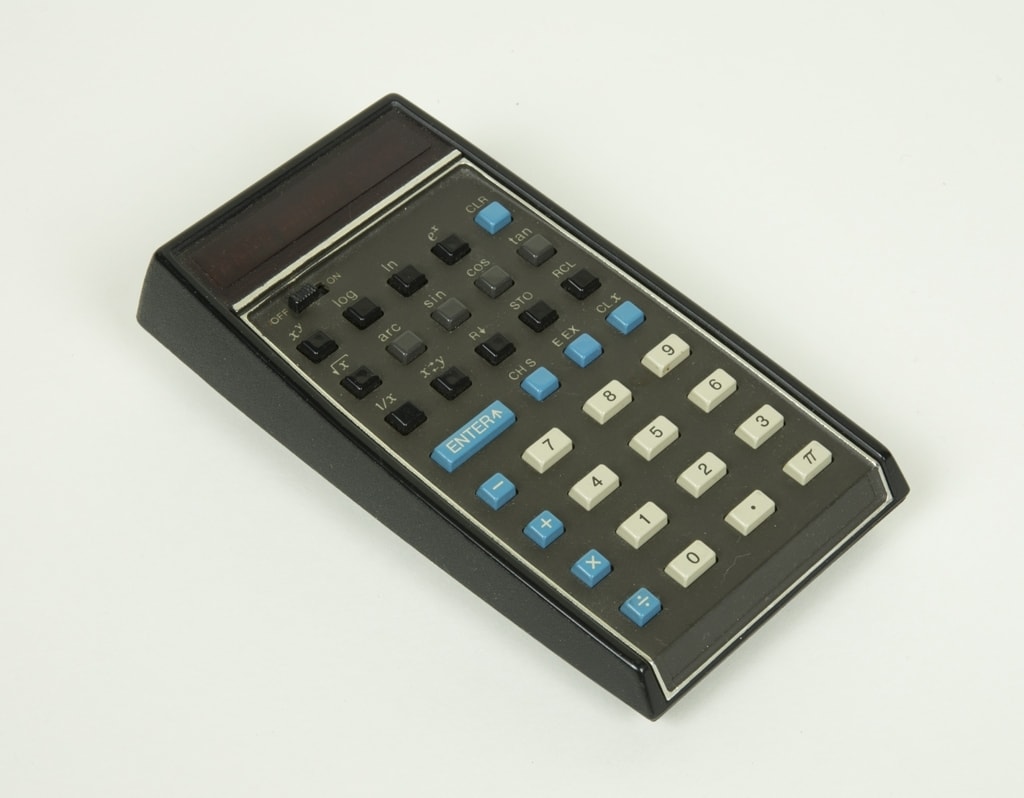It’s out! Empire of the Sum is now available in the US, and to mark the occasion I’m posting about a few of my favourite calculators. Today’s is the Hewlett-Packard HP-35, a scientific calculator that today looks quite unremarkable — and yet which, at the time, was revelatory.

Depending on the reader’s age, the name “Hewlett-Packard” may evoke calculators, desktop computers or printers. (Or, maybe, nothing at all.) But for the first few decades of the company’s existence, it specialised in electronic “instruments” such as the oscilloscopes, signal generators and other tools that an engineer might use to design or test an electrical or electronic circuit. Conceived by HP’s co-founder, Bill Hewlett, the HP-35 was to be the company’s route out of that niche and into a wider world of consumer electronics.
The thing about the HP-35 is this: unlike many other calculators at the time, no part of it was truly without precedent. Scientific calculators were not new, although they were sized for desks rather than pockets (and nor had anyone thought to market them to consumers rather than engineers). Integrated chips were not new, although they were rarely as complex as those in the HP-35. LED displays were not new, but they were very expensive and not often seen in calculators. What the HP-35 did do that no other device had managed before was to bring all these things together into a package that was portable, powerful, and, crucially, aesthetically pleasing.
HP’s first pocket calculator turned out to be a smash hit. Sold at Macy’s and advertised in Esquire, the HP-35 had an appeal far beyond mathematicians and scientists, and the company could barely keep up with demand. Students sold their cars to buy them. NASA engineers had to lock theirs away to stop them from going walkabout. US army math instructors devised a new course as an excuse to buy HP-35s on expenses. And HP never looked back: the company that had once built engineering gadgets for engineers now aimed its products at the public at large. Some observers, in fact, credit the HP-35 with inaugurating the whole category of consumer electronics; your iPhone, tablet or laptop computer may never have come about without it.
A big thank you to Jim Hughes at Codex99, whose article was the catalyst for my chapter on the HP-35. His writing is excellent, and his site is well worth a moment of your time.
If you’d like to order a copy of Empire of the Sum, this post will point you in the right direction. And if you’d like to hear more about the history of the pocket calculator first, have a listen to my chat with Dallas Campbell on the history of digital calculators.
Comment posted by Mary Ann Atwood on
According to my calculations, I am not one of the number who have won a copy of “Empire of the Sum”. Figures…
Comment posted by Keith Houston on
Hi Mary Ann – don’t despair just yet! The competition is closed, but I haven’t yet picked a winner. I’ll post to the site when I do.